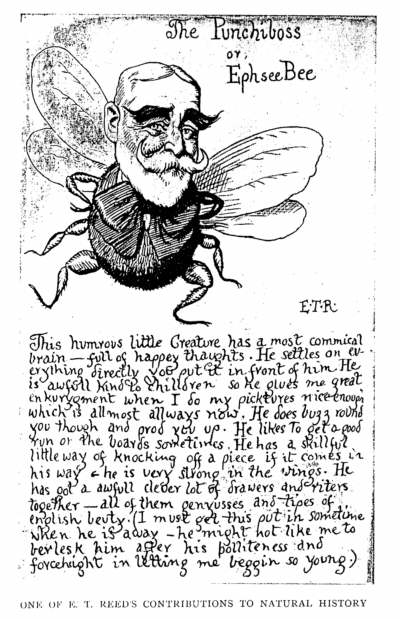| THE COLONEL |
• More Burnand Portraits from the National Portrait Gallery

BURNAND, Sir Francis Cowley, cr. 1902; dramatic author, third editor of Punch; b. Nov. 29, 1836; descended on his father’s side from an old Savoyard family, and on mother’s from Mrs. Cowley, the famous dramatic authoress; e. Eton and Trinity College, Cambridge; founded the A.D.C., Cambridge, 1855; called to Bar and practised occasionally; m. (1) Cecilia Victoria Ranoe, a favourite actress, (2) Mrs. Payson Jones, widow; his first farce, written when he was fifteen, played privately at Eton, and publicly at Worthing; one of the most prolific dramatic authors and burlesque writers ever known, nearly 200 works standing to his credit, many of which secured extraordinary success; his first production on the public stage was a burlesque entitled, “Dido,” produced at the St. James’s Theatre, as far back as 11 Feb., 1860; his most notable pieces have been “The Iles of St. Tropez,” 1860; “Fair Rosamond,” 1862; “The Deal Boatman,” 1863; “Ixion, or the Man at the Wheel,” 1863; “Windsor Castle,” 1865; “Black Eyed Susan” (burlesque), 1866; “Cox and Box,” 1867; “The Turn of the Tide,” 1869; “Poll and Partner Joe,” 1871; “Artful Cards,” 1877; “Proof,” 1878; “Our Club,” 1878; “Betsy,” 1879; “The Colonel,” 1881; “Captain Therèse,” 1890; “La Cigale,” 1890; “Miss Decima,” 1891; “The Saucy Sally,” 1892; “Mrs. Ponderbury’s Past,” 1895; in collaboration with J. Hickory Wood wrote pantomime “Cinderella,” produced at Drury Lane, 1905; and for the same theatre, 1909, was partly responsible for the pantomime, “Aladdin”; was on Punch about forty-five years, and as editor he completed his twenty-fifth year in 1905, retiring in 1906; was knighted in 1902; wrote “Personal Reminiscences of the A.D.C., Cambridge,” 1880, and “Records and Reminiscences,” 1904. Address: 18 Royal Crescent, Ramsgate. Club: (London) Garrick.
(Died 21 Apr. 1917; age 80)
(Source: Who’s Who in the Theatre, comp. & ed. John Parker, 2nd. ed., London: Pitman, 1914, p. 84; the final addition is from Who Was Who in the Theatre: 1912–1976, Detroit: Gale, 1978, p. 335.)
In the 1860s, Burnand collaborated with Arthur Sullivan, providing the libretti for two comic operas: Cox and Box (1866) and The Contrabandista (1867, revised as The Chieftain, 1894). All are available online, via the Burnand page in the Gilbert and Sullivan Archive.
Dear Grossmith, I should like to go to the first night of your new opera [Gilbert and Sullivan’s Patience] at Easter ...
With Gilbert and Sullivan I am sure we will have something better than the dull farce of The Colonel. I am looking forward to being greatly amused.
(Oscar Wilde, Letter to George Grossmith [who played Bunthorne in Patience], Keats House [April 1881], Complete Letters, ed. Merlin Holland and Rupert Hart-Davis, New York: Henry Holt, 2000, p. 109)
... I have also, you will be interested to hear, seen Indians; most of them are curiously like Joe Knight in appearance, ... There are also among them Burnands and Gilberts — in fact Burnand in a blanket and quite covered with scarlet feathers is now trying through the window to force me to buy a pair of bead slippers and making signs to a ruffianly looking Gilbert who is with him to tomahawk me if I refuse.
(Oscar Wilde, Letter to Mrs. Bernard Beere, [?Sioux City, ?c. 20 March 1882], Complete Letters, 152–3)
... [The liar] is the very basis of civilised society, and without him a dinner party, even at the mansions of the great, is as dull as a lecture at the Royal Society, or a debate at the Incorporated Authors, or one of Mr. Burnand’s farcical comedies.
(Oscar Wilde, “The Decay of Lying,” quoted after George P. Landow’s etext on the Victorian Web from: The Complete Writings of Oscar Wilde, vol. 7, New York: The Nottingham Society, 1909, p. 29 [in The Nineteenth Century, where Decay was first published in January 1889, the comment on Burnand is omitted])